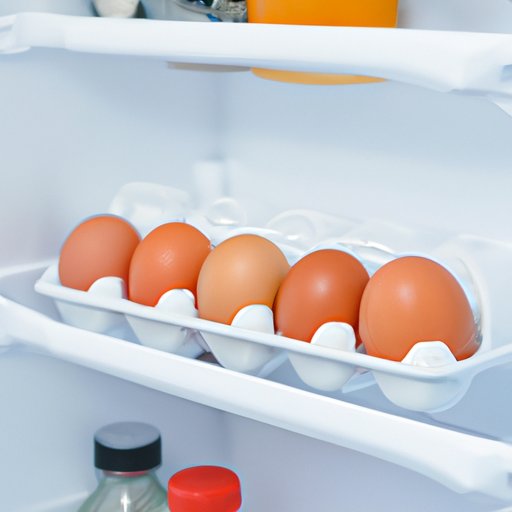Introduction
Eggs are one of the most versatile ingredients in the kitchen, and they can be used in a variety of recipes. However, it’s important to know how to store eggs properly in order to ensure their safety and longevity. How long can you keep eggs in the fridge? This article will explore the best practices for storing eggs in the refrigerator and provide tips on how to maximize their shelf life.

Maximizing Shelf Life of Eggs in the Refrigerator
Proper storage is essential for keeping eggs fresh for longer. The United States Department of Agriculture (USDA) recommends storing eggs in their original carton and placing them in the coldest part of the refrigerator. It’s also important to avoid storing eggs near foods with strong odors, as this can cause the eggs to absorb those odors.
Temperature control is also an important factor when it comes to maximizing the shelf life of eggs in the refrigerator. According to the USDA, eggs should be kept at 40°F or lower. Keeping eggs too warm can lead to the growth of bacteria that can cause food-borne illnesses.
Tips for Keeping Eggs Fresh for Longer in the Fridge
One of the best ways to keep eggs fresh for longer is to avoid high-moisture environments. This means not storing eggs in areas of the refrigerator where condensation can form, such as the door shelves. Additionally, eggs should be kept covered to protect them from absorbing any odors or flavors from other foods in the refrigerator.

How to Tell If Your Eggs Are Still Good After Refrigeration
The best way to tell if your eggs are still good after refrigeration is to check the expiration date on the carton. If the eggs are still within the recommended shelf life, then they should be safe to eat. Additionally, you can crack an egg into a bowl and check for any signs of spoilage, such as an off odor or discoloration.
The Do’s and Don’ts of Storing Eggs in the Refrigerator
When it comes to storing eggs in the refrigerator, there are some do’s and don’ts to keep in mind. Here are some of the do’s:
- Keep eggs in their original carton.
- Store eggs in the coldest part of your fridge.
- Use eggs within 3-5 weeks of purchase.
And here are some of the don’ts:
- Don’t wash eggs before storing.
- Don’t keep eggs near foods with strong odors.
- Don’t leave eggs out of the refrigerator for more than 2 hours.

What You Need to Know About Refrigerating Eggs
Refrigerating eggs can have several benefits, including extending their shelf life and protecting them from contamination. Refrigeration can also help prevent the growth of bacteria, which can cause food poisoning if consumed. However, it’s important to note that refrigerating eggs can also have its risks. Prolonged refrigeration can cause the proteins in the egg whites to break down, leading to a decrease in quality.
How Long Can You Keep Eggs in the Fridge?
According to the USDA, eggs can be safely stored in the refrigerator for up to 3-5 weeks after purchase. However, it’s important to note that these guidelines are based on the assumption that the eggs were properly handled and stored at the correct temperature. If the eggs were not handled or stored properly, then the shelf life may be shorter.
It’s also important to remember that while eggs can be stored in the refrigerator for up to 3-5 weeks, it’s best to use them as soon as possible for optimum quality. As the egg ages, it may lose some of its flavor and texture.
Conclusion
Eggs can be safely stored in the refrigerator for up to 3-5 weeks, but it’s important to practice proper handling and storage techniques in order to maximize their shelf life. Be sure to keep eggs in their original carton, store them in the coldest part of the refrigerator, and use them within 3-5 weeks of purchase. Additionally, avoid washing eggs before storing, keep them away from foods with strong odors, and don’t leave them out of the refrigerator for more than 2 hours. By following these guidelines, you can ensure that your eggs stay fresh and safe to eat for longer.
(Note: Is this article not meeting your expectations? Do you have knowledge or insights to share? Unlock new opportunities and expand your reach by joining our authors team. Click Registration to join us and share your expertise with our readers.)
